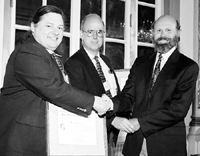LBNL Researchers Bell and Colella Receive First SIAM/ACM Prize in CSE
September 30, 2003

Recognized in Montreal for new methods and tools, including adaptive mesh refinement software, and their application to an exceptionally wide range of problems in science and engineering were Phillip Colella (left) and John Bell (middle), shown here accepting the congratulations of SIAM president Mac Hyman.
The prize committee cited Bell and Colella "for the development of mathematical methods and computer science tools for science and engineering, including adaptive mesh refinement software, and for their application to the solution of a wide variety of physical problems in fluid dynamics, shock wave theory, combustion and astrophysics." The LBNL researchers are the first to receive the prize, which was established by the Association for Computing Machinery and SIAM and is to be awarded jointly by the two societies every other year.
"The development of applied numerical algorithms is critical to advancing scientific research in areas that are at the heart of the Office of Science mission," said Ray Orbach, who heads DOE's Office of Science. "We are proud to have them devoting their talents to tackling problems of global significance."
As director of the Center for Computational Sciences and Engineering at LBNL, Bell heads up a variety of projects, among them three-dimensional simulations of turbulent methane combustion. By incorporating chemistry into their models of turbulent flows, the researchers are seeking to produce simulations that not only predict the basic energetics of the flame, but also quantify the detailed chemical behavior within the flame. Images from their fully resolved simulations of methane combustion with comprehensive chemistry for a
laboratory-scale flame, and from related computations, can be found at http://seesar.lbl.gov/CCSE/Research/Combustion/V-flames.html; one example, an illustration from the SCaLeS report described by David Keyes, in "Building a Science-Based Case for Large-Scale Simulation."
The principal focus of Colella's current work is the development of new simulation software tools for multiscale problems in science and engineering. The current focus of the group he leads, the Applied Numerical Algorithms Group, is finite difference methods for the solution of partial differential equations in complex geometries. The equations of interest arise in compressible and incompressible fluid dynamics; an embedded boundary model, in which the boundary of a complex domain cuts away at a regular Cartesian grid, allows the use of highly efficient and well-understood methods in regions of the grid away from the boundary, with irregular grid methods confined to the small region of the domain near the boundary. Target applications for these tools include non-ideal magnetohydrodynamics problems arising in magnetic fusion, beam dynamics in accelerator design problems, simulation of gas jets in laser-driven plasma-wakefield accelerators, multiphase flow in microgravity environments, geophysical and environmental fluid mechanics, and detailed spatial modeling of microbes.
Much of the software development done by Colella's group is part of the activity of the Applied Differential Equations Integrated Software Infrastructure Center (APDEC), which is sponsored by DOE's SciDAC---Scientific Discovery through Advanced Computing---program. Colella is the project leader for APDEC; more information can be found at http://davis.lbl.gov/APDEC.
Bell and Colella and their colleagues have also created libraries of computational tools based on adaptive mesh refinement; see http://seesar.lbl.gov/AMR/index.html.

